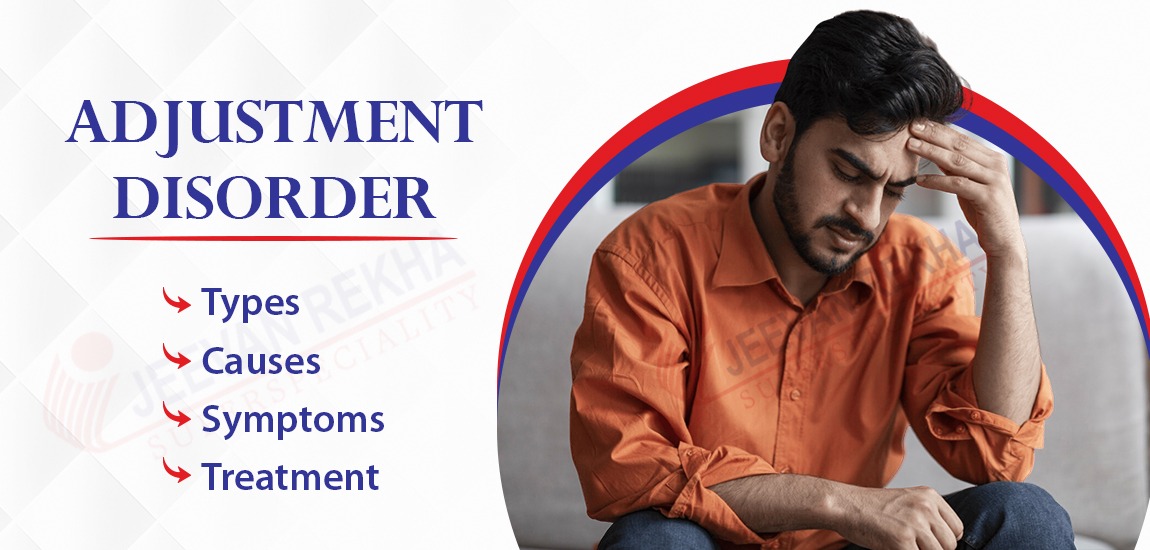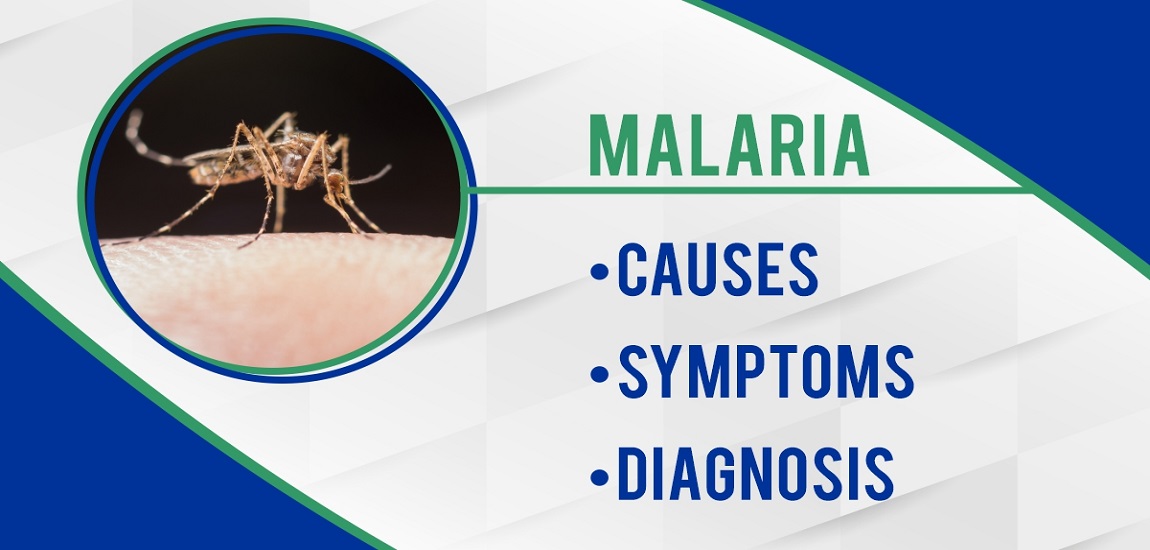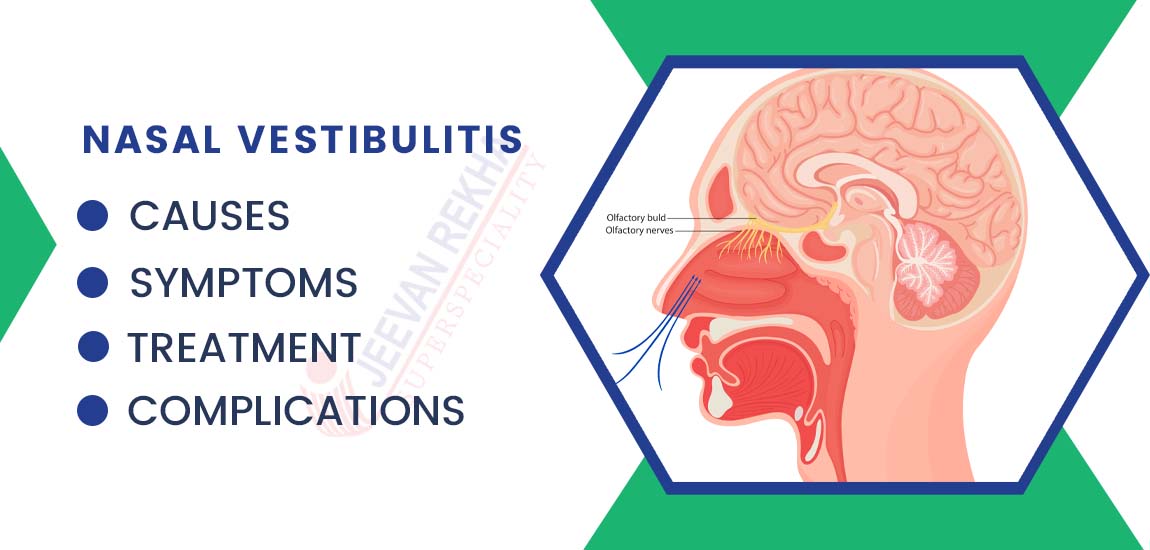
- By JRSH Admin
- In Health and Tips,
- Posted December 22, 2023
Adjustment Disorder: Types, Causes, Symptoms and Treatment
An intense response to stress or trauma is known as an adjustment disorder. A stressful event might be either favorable or unfavorable. It produces transient symptoms that impact your emotions, behaviors, and thoughts. You might be reacting more expressively than people would anticipate.
What is Adjustment Disorder?
A strong emotional or behavioral response to stress or trauma is known as an adjustment disorder. Short-term symptoms may cause you to react more than you would have anticipated. You can find it easy to cry or to feel hopeless and depressed. You might behave impulsively or recklessly, or you might overindulge in risky activities. Each person has different feelings and behaviors.
Symptoms of adjustment disorder can occasionally result from a single incident. In other cases, after driving you to a breaking point, a series of events may trigger symptoms. Six months usually marks a reduction in symptoms.
Types of Adjustment Disorder
Adjustment disorder is a psychological condition characterized by emotional and behavioral symptoms that develop in response to a stressful life event. There are several types of adjustment disorders, each with distinct features:
- Adjustment Disorder with Depressed Mood: This subtype involves feelings of sadness, hopelessness, and a general low mood in response to a stressor.
- Adjustment Disorder with Anxiety: Individuals with this type experience excessive worry, nervousness, and other anxiety-related symptoms triggered by a specific stressor.
- Adjustment Disorder with Mixed Anxiety and Depressed Mood: This subtype combines symptoms of both depression and anxiety, reflecting a complex emotional response to the stressor.
- Adjustment Disorder with Disturbance of Conduct: This type is characterized by behavioral problems, including defiance, reckless actions, or other disruptive behaviors, stemming from the stressor.
- Adjustment Disorder with Mixed Disturbance of Emotions and Conduct: Individuals with this subtype exhibit a combination of emotional and behavioral symptoms in response to a stressor.
- Adjustment Disorder Unspecified: This category is used when symptoms do not fit neatly into the other subtypes, but there is clear evidence of distress in response to a stressor.
Symptoms of Adjustment Disorder
Adjustment disorder is characterized by a range of emotional and behavioral symptoms that occur in response to a specific stressor or life event. These symptoms often develop within three months of the triggering event and may include:
- Emotional Distress: Persistent feelings of sadness, hopelessness, or overwhelming anxiety.
- Cognitive Symptoms: Difficulty concentrating, indecisiveness, or preoccupation with the stressor.
- Changes in Behavior: Disruption of daily routines, withdrawal from social activities, or avoidance of responsibilities.
- Physical Symptoms: Sleep disturbances, changes in appetite, headaches, or other physical complaints without a clear medical cause.
- Impaired Social Functioning: Difficulties in relationships, either withdrawing from social interactions or engaging in conflict.
- Disturbance of Conduct: Behavioral problems, such as acting out, reckless behavior, or aggressive actions.
- Lack of Adjustment: Difficulty adapting to the demands of the stressor, even when it is not an extraordinary event.
Also Read: High blood pressure (Hypertension) - Symptoms and Causes
Causes of Antisocial Personality Disorder
Antisocial Personality Disorder (ASPD) is a complex mental health condition with multifaceted causes. The etiology of ASPD is not fully understood, but a combination of genetic, neurological, and environmental factors is believed to contribute. Here are some key factors associated with the development of Antisocial Personality Disorder:
- Genetic Factors: There is evidence to suggest a genetic predisposition to antisocial behavior. Individuals with a family history of antisocial or criminal behavior may be at a higher risk of developing ASPD.
- Neurobiological Factors: Differences in brain structure and function, particularly in areas related to impulse control, emotional regulation, and moral decision-making, may play a role in the development of ASPD.
- Environmental Factors: Adverse childhood experiences, such as neglect, abuse, or a chaotic family environment, can contribute to the development of antisocial traits. Lack of positive role models and inconsistent discipline during childhood may also be influential.
- Early Conduct Disorder: Conduct disorder during childhood, characterized by aggressive and antisocial behavior, is often considered a precursor to ASPD. Many individuals diagnosed with ASPD exhibit conduct disorder symptoms during their youth.
- Neurodevelopmental Factors: Factors that affect early brain development, such as prenatal exposure to substances, complications during birth, or early childhood head injuries, may contribute to an increased risk of developing ASPD.
- Psychosocial Factors: Certain psychosocial factors, including a lack of positive socialization, poor peer relationships, and academic difficulties, can contribute to the development of antisocial traits.
Diagnosis of Antisocial Personality Disorder
The diagnosis of Antisocial Personality Disorder (ASPD) is typically made by mental health professionals, such as psychiatrists or psychologists, through a comprehensive assessment that considers various aspects of an individual's behavior, history, and mental health. The process involves the following key elements:
- Clinical Interview: A thorough clinical interview is conducted to gather information about the individual's current and past behavior, relationships, and experiences. This interview may involve discussions about symptoms, childhood history, family background, and interpersonal relationships.
- Diagnostic Criteria: The mental health professional refers to the criteria outlined in the Diagnostic and Statistical Manual of Mental Disorders (DSM-5), which is a widely used classification system for mental health conditions. To be diagnosed with ASPD, an individual must meet specific criteria, including a pervasive pattern of disregard for the rights of others, deceitfulness, impulsivity, irritability, aggression, lack of remorse, and failure to conform to social norms.
- History of Conduct Disorder: Many individuals diagnosed with ASPD have a history of conduct disorder symptoms during childhood or adolescence. Conduct disorder is a precursor to antisocial behavior and is characterized by repetitive and persistent patterns of violating societal norms and the rights of others.
- Rule Out Other Disorders: Before treating a patient, the clinician must rule out any other mental health issues that could be causing their symptoms. It's essential to differentiate ASPD from other personality disorders, mood disorders, or substance use disorders.
- Collateral Information: Information from collateral sources, such as family members, friends, or legal records, may be considered to corroborate the individual's self-report and provide additional context.
- Duration and Consistency: The antisocial behaviors must be consistent and enduring, typically observed since adolescence or early adulthood. The diagnosis is not made for isolated incidents but rather for a pervasive pattern of behavior.
Also Read: Anxiety: Causes, Symptoms, and Treatment
Prevention of Antisocial Personality Disorder
Prevention of Antisocial Personality Disorder involves early identification and intervention in at-risk individuals. Key strategies include:
- Early Intervention: Identify and address conduct disorder symptoms in childhood through targeted interventions, such as behavioral therapy and family support.
- Positive Parenting: Promote positive parenting practices to create a supportive and nurturing environment, reducing childhood adversity risk.
- Education and Awareness: Increase awareness about the impact of childhood experiences on mental health, emphasizing the importance of a stable and loving environment.
- Community Programs: Implement community-based programs that provide support, education, and resources for at-risk families to enhance parenting skills and promote healthy child development.
- Mental Health Services: Ensure access to mental health services for individuals with early signs of behavioral problems, addressing issues before they escalate.
Treatment of Antisocial Personality Disorder
Treatment of Antisocial Personality Disorder (ASPD) is challenging, as individuals with this condition often exhibit resistance to change and may not perceive a need for treatment.
However, certain interventions and strategies may be employed to manage specific behaviors and improve overall functioning. It's important to note that treatment outcomes can vary, and there is no definitive cure for ASPD. Here are the key components of the treatment approach:
- Psychotherapy:
- Cognitive-behavioral therapy (CBT): Focuses on identifying and changing dysfunctional thought patterns and behaviors. Targeted interventions may address impulsivity, aggression, and social skills deficits.
- Dialectical Behavior Therapy (DBT): A type of therapy that combines cognitive-behavioral techniques with mindfulness strategies to improve emotional regulation and interpersonal effectiveness.
- Medication: While there are no specific medications approved for the treatment of ASPD itself, certain medications may be prescribed to address co-occurring conditions such as depression, anxiety, or impulse control problems.
- Group Therapy: Group settings may provide an opportunity for individuals with ASPD to learn and practice social skills, empathy, and appropriate interpersonal behaviors under the guidance of a therapist.
- Treatment of Co-Occurring Disorders: Addressing any co-occurring mental health or substance use disorders is crucial. Treating these conditions may help improve overall functioning and reduce the risk of harmful behaviors.
- Supervision and Monitoring: Individuals with ASPD may require close monitoring, especially in legal or forensic contexts, to prevent harm to themselves and others. This may involve probation, parole, or other legal interventions.
- Family Involvement: Involving family members in the treatment process can be beneficial for providing support and helping to create a more stable environment.
- Social and Vocational Skills Training: Teaching and reinforcing social and vocational skills can enhance an individual's ability to function in society and maintain employment.
It's important to note that the effectiveness of treatment for ASPD can be limited, particularly in cases where the individual is not motivated to change. Early intervention and a comprehensive, multidisciplinary approach are essential. Legal and ethical considerations may also play a role in managing individuals with ASPD, especially when their behavior poses a risk to themselves or others. Treatment plans should be individualized, focusing on harm reduction and improving the individual's quality of life.
Tags
Blog Search
Latest Posts
-
Ear Infections (Otitis Media): Top Triggers & How to Avoid Them?
April 11, 2025 -
Implantation Bleeding Vs Periods: Know the Difference
March 12, 2025 -
5 Tips for a Happy and Healthy Summer
February 27, 2025 -
Body Ache (Pain): Causes, Symptoms and Treatment Options
February 10, 2025 -
Fatigue and Exhaustion: Causes, Symptoms, and Treatment
January 08, 2025




